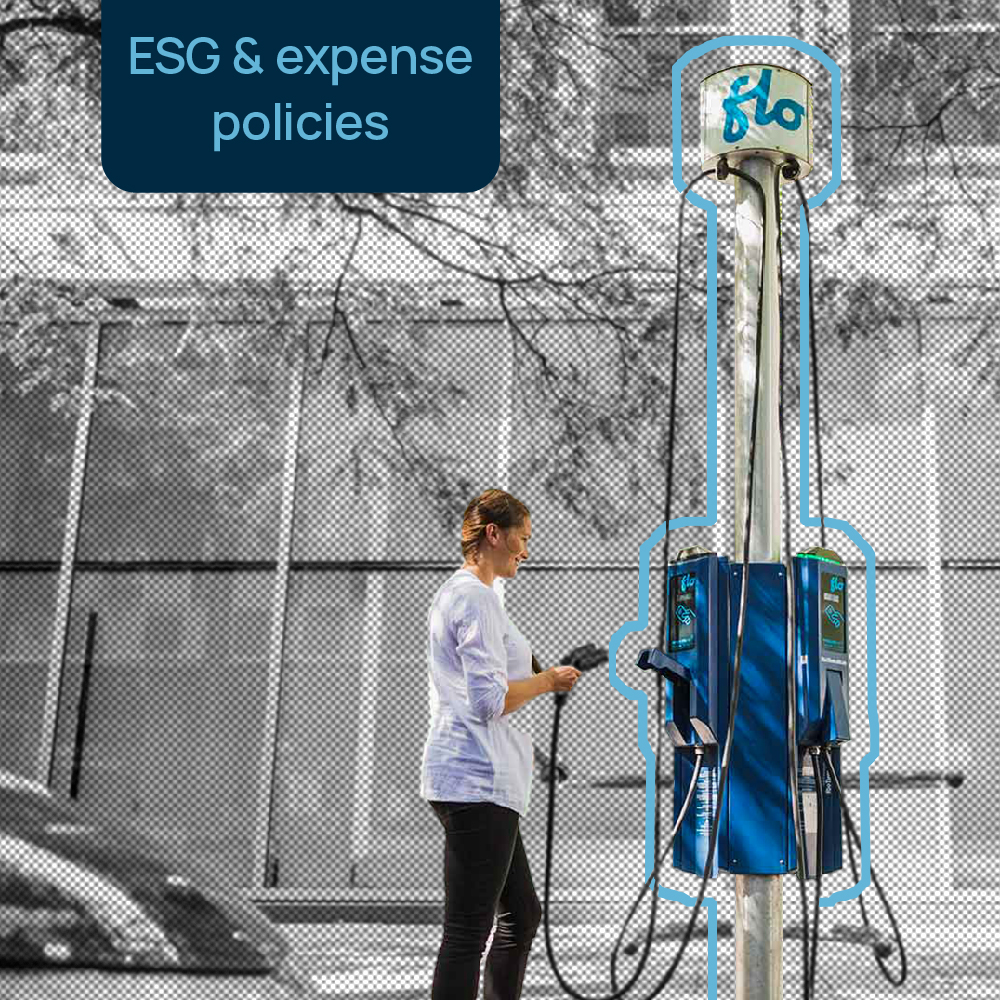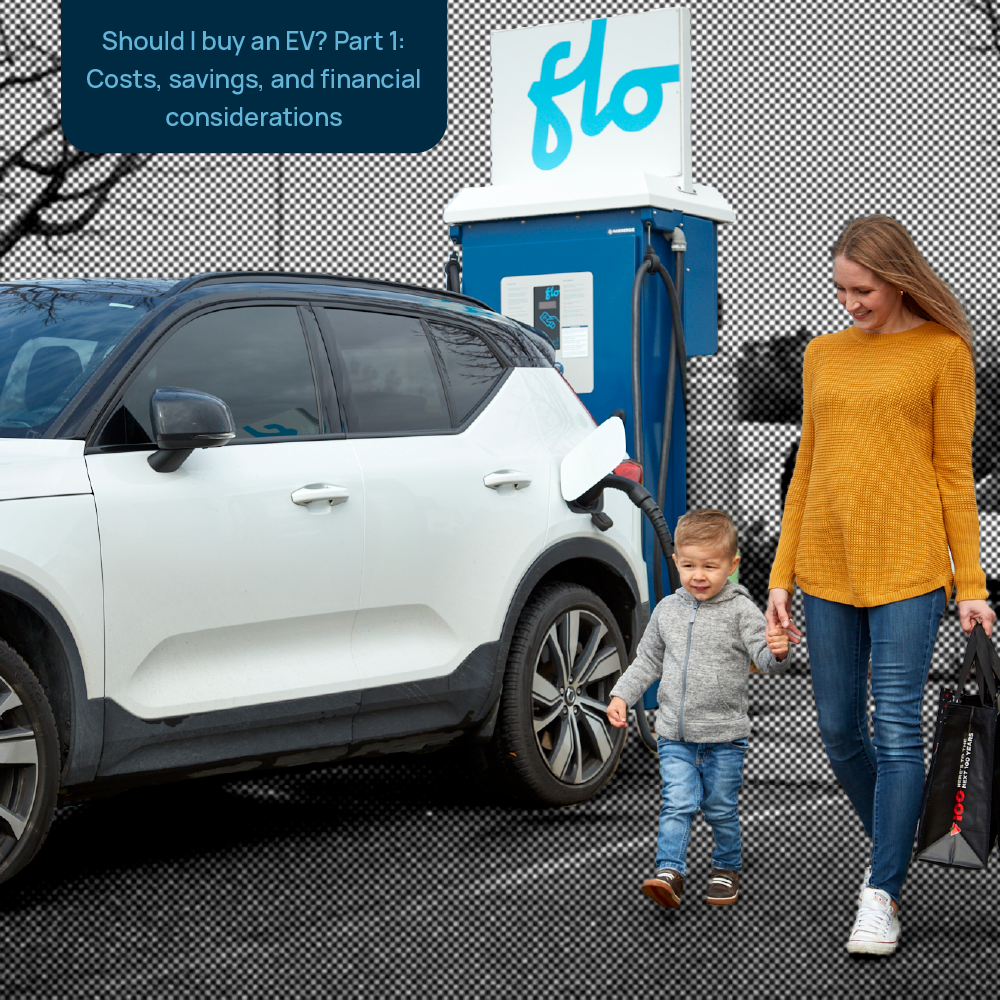- For EV Drivers
- For Business
- Incentives
- Alberta incentives
- British Columbia incentives
- Manitoba incentives
- New Brunswick incentives
- Newfoundland and Labrador incentives
- Northwest Territories incentives
- Nova Scotia incentives
- Nunavut incentives
- Ontario incentives
- Prince Edward Island incentives
- Quebec incentives
- Saskatchewan incentives
- Yukon incentives
- Products
- Insights
- Company
- Shop now
10 ideas for reducing your company’s carbon footprint through expense policies
Companies are quickly starting to realize that Environmental, Social, and Governance (ESG) policies can create real value – whether that means attracting new customers, aligning core values with business objectives, or reducing costs linked to energy consumption.
There are many things companies can change to lower their emissions, and one that frequently flies under the radar is their expense policies.
More specifically, employee travel can be a big contributor to a company’s environmental footprint. Rewarding employees for traveling more sustainably and avoiding unnecessary trips is a fantastic way to reduce your carbon footprint and ensure you are delivering a consistent message to employees and stakeholders that ESG matters for your company. Here are a few tips to get you started.
What is an ESG policy?
A corporate Environmental, Social, and Governance (ESG) policy is a set of principles or guidelines that a business follows to ensure that it is operating in a sustainable, ethical, and responsible manner. It outlines all business practices related to environmental, social, and governance issues.
For the company
Environmental factors can include a company’s carbon footprint and the amount of waste it produces. Social factors consider how a company treats its employees, health and safety, customers, and suppliers, as well as its social impact on the communities in which it operates. Finally, governance focuses on leadership, business practices, structure, and transparency.
For investors
In addition to the impact on people and the planet, corporate social responsibility is increasingly important for more and more investors. These investors want to make sure they’re placing their money and confidence in companies that are not only profitable, but also committed to long-term sustainable practices. Companies with strong ESG policies are often seen as more trustworthy, since they are better positioned to manage risks and capitalize on opportunities in an ever-changing business landscape.
For employees
More and more, workers are on the lookout for companies that share their values, and ESG is a shining example of how much you care about the well-being of your team, society, and the environment. Companies with these policies in place send the message that they are “walking the talk”.
Simple ESG policies that reduce travel emissions
Go virtual whenever possible
There’s a reason why the first of the four Rs – reduce, reuse, recycle and recover – is “reduce”. Avoiding travel or in-person meetings unless absolutely necessary is one of the easiest ways to curb pollution caused by work travel. To help employees decide between face-to-face and remote, your company can provide guidelines that are tailored to its culture and operations.
Opt for land versus air
In many areas of the world, rail and bus emissions are far lower than air travel emissions, and electric buses or vehicles are one of the best possible options. Encourage employees to use these modes whenever they can. Ideally, companies can even offer incentives like a higher per diem for employees who use sustainable forms of ground transportation. You can even reach out to your booking company to let them know you prefer electric cars as a default.
Facilitate EV travel with prepaid cards
Pre-filled FLO cards make every ride that much smoother (especially for beginners who haven’t yet mastered EV charging etiquette). Give these cards to your employees so they can use EV chargers on the go with ease, including the FLO network and our roaming partners’ networks.
Support transit and “micro mobility”
Get your team moving with public transit, bikes, and scooters. Transport subsidies and incentives are relatively common these days, so if you haven’t put one in place yet, this is your sign! What’s critical is that you make claims easy enough so that employees aren’t dissuaded by a bunch of paperwork and generous enough so that employees are incentivized to make the right choice. And the best part is, you’ll still likely end up paying a lot less per trip!
Give EV mileage bonuses for EVs
If your employees provide their own vehicles, but are reimbursed for mileage, consider a mileage bonus to help them financially justify switching to an EV. A differential rate could help employees who are reluctant to opt for a low-carbon vehicle.
Go green with ride sharing
As you define your ESG policy, make sure it clearly gives employees the option to easily expense their hybrid or EV rideshare costs, like those offered by Uber Green!
On a business trip, another good idea is to establish a carpool matching program where employees can find potential carpool partners based on their schedules.
Offset flights
Some flights really are necessary. In these cases, you can offset the total distance traveled. While this option is certainly not as eco-friendly as ditching the flight, it’s a good complement to a larger emission reduction strategy.
Buying carbon offsets credits in bulk is cheaper. Just make sure you choose a provider that actually helps the environment – they’re not all created equal! Projects recognized by the Gold Standard are usually great picks.
Incentivize choosing an electric company car
If you offer company-supplied vehicles as a perk, consider adding a supplemental allowance for employees who choose an EV. This is a super effective way to reduce harmful greenhouse gases and other emissions, especially for those who accumulate miles quickly!
Lead the charge
Installing EV chargers onsite is a very good way to encourage employees who drive to work to go electric. If you want to go one step further, you can even consider supporting your employees at home! Having access to a home charger is a very strong incentive to adopt EVs – plus, if they get a smart charger, they’ll be able to reduce their cost per charge and overall impact on the grid.
Educate your team
Many employees want to do their part, but they don’t always know where to start. Whenever you change or update your ESG policy, explain why you did it: as with any new internal policy, effective communication, education, and onboarding are key to earning staff buy-in.
Ready to commit to greener transport solutions? Step one is to contact the FLO team! We can help orient you towards the right EV charging solutions for your business.



















